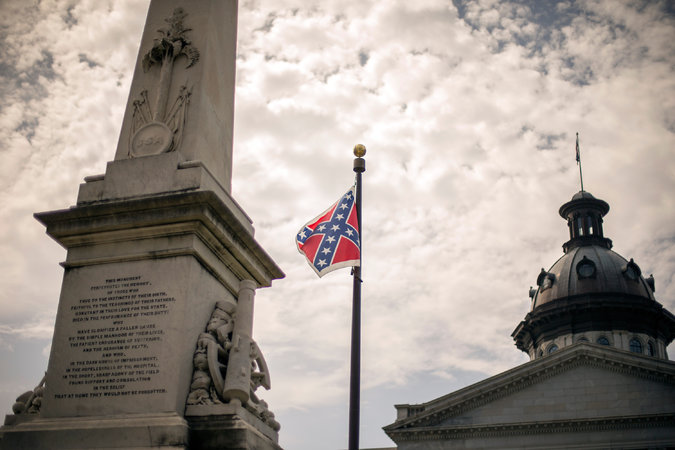The “conservative” Boston Globe columnist, Jeff Jacoby, thinks that the Confederate flag is “anti-American,” “an ugly symbol of oppression,” “the most poisonous ideologies in our national history,” “racial bigotry and victimization,” “racial hatred,” and “the right of white Americans to buy and sell black Americans.”
The flag is also “the banner of slaughter” that “represents armed rebellion against the United States.”
In the interest of intellectual and moral cogency, I offer the following points for Mr. Jacoby’s consideration.
First, Jacoby has succeeded in resolving the single most complex, controversial issue in our nation’s history into a verdict that can fit into a hashtag or bumper sticker: The Confederates fought for “racial hatred.”
On its face alone, it is painfully clear already that Jacoby prefers the ad hominem attack for thoughtful argument.
Second, despite the “poisonous” cause that he assigns to the Confederates, Jacoby doesn’t doubt that legions of “men and boys” were “noble” in having “fought with courage and died with honor.”
This is a perhaps impossible position to defend. If the Confederates’ cause was the unmitigated evil that Jacoby says it was, then the Confederates were evil. However, if the latter is true, then they were ridden with vices, not the virtues that Jacoby attributes to them, for virtue is the stuff of good character, and those with good character can’t defend “oppression,” “racial hatred,” and the like.
Third, in light of the facts that well over 90 percent of Confederates didn’t own any slaves; of the six percent that did own slaves, half owned no more than five slaves per person; and free blacks fought alongside their white counterparts so that the Southern states could secede from the Union, Jacoby’s assertion that Southerners sacrificed all for nothing more or less than “the right of white Americans to buy and sell black Americans” is patently absurd.
Fourth, even assuming (counterfactually) that slavery is the only reason that Southerners wanted to secede, either they had a right to secede from the Union or they did not. The South’s critics, like Jacoby, invariably make two claims that, at least implicitly, contradict one another: (1) The Southern states—and by implication, any and all states that contracted to be party to these United States of America—had no right to secede; (2) The Southern states had no right to secede for the reason of slavery.
Now, if (1) is true, then it matters not whether the South’s reasons for wanting to secede were odious or noble. All that matters is that it had no right to secession. But if (2) is true, then the implication is that there is a right to secession, but this right can be exercised only for morally sound reasons, i.e. reasons that others find acceptable.
Both (1) and (2) can’t be correct.
If Jacoby and company maintain (1), then there are no states. A state, being a sovereign agent, must have the right to secession, for the latter is nothing other than the fundamental right to freedom of association. To deny this right is to deny a state’s sovereignty over itself—or to deny that it is a state.
If Jacoby and his ilk maintain (2), then, again, they deny the very existence of states. To repeat, there can be no genuine right to freedom of association—a right to secession—if a state must seek permission from others before it is allowed to charter its own destiny.
Finally, only if Jacoby assumes that morality is a one-size-fits-all kind of thing can he pass judgment upon those Southern whites who fought for the Confederacy. But if morality consists of timeless universal principles, then by those standards we must condemn just as forcefully those Southern whites who founded America.
Washington, Jefferson, Madison and many others—massive slave holders—Jacoby must affirm, are at least as guilty as their Southern descendants for promoting “racial hatred, “oppression,” and all of the other hideous charges that Jacoby levels against the men and women of the Confederacy.
By his own reasoning, Jacoby implicitly demands that we cleanse our nation of all reminders of our Founders.
To avoid this conclusion, Jacoby could say that it is unfair to judge Washington and company by the moral standards of today. There are, though, three problems with this move.
First of all, if this claim is correct, then, contra Jacoby’s starting point, there are no universal timeless moral principles: Moral standards are historically and culturally-specific.
Furthermore, if it is unfair to judge the Founders by the moral standards of today because there are no timeless universal principles (like “natural rights”), then the Founders were wrong when they enshrined such principles into the Declaration.
Thirdly, if it is unfair to judge the Founders by the moral standards of today, then it is unfair to judge the Confederates by the moral standards of today.
Jacoby has some thinking to do. And while he’s at it, he should pray to God that millions of white Southern men and women (and some black Southerners too) don’t read this breathtakingly offensive piece of his.
If they do, they may think that his thoughts on them and their ancestors represent those of the GOP.







